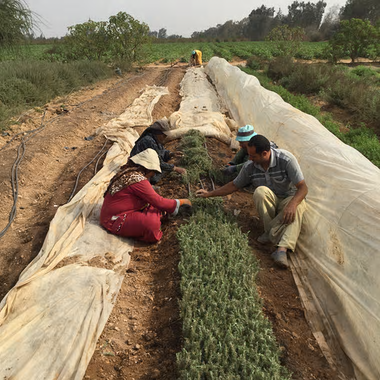For many of the poorest people in Egypt, life can be tough. With a population of 95 million, Egypt is one of the fastest growing and most densely populated countries in the world. Competition for jobs and resources runs high. People with less education and fewer skills face tremendous obstacles to employment and can struggle to improve their living standards and lift themselves out of poverty.
Additionally, societal norms expect women to stay at home and not work. Low pay, lack of access to diverse vocations, financial literacy and economic resources are just a few of the forms of discrimination affecting women.
A significant proportion of the world’s poor live in rural areas, and around two billion adults lack access to the necessary financial services they need to start a business and build a path out of poverty.
In September 2015, the United Nations launched the (SDGs) with a vision to end poverty, overcome inequality and injustice, tackle climate change and ensure a quality education for all by 2030. The Sustainable Development Solutions Network estimates that it will cost around $1.4tn (£920bn) each year to meet these 17 goals. Governments alone will not be able to foot the total bill, so the investment community must step up.
This is where the social investment co-op Oikocredit steps in, where I work as client and office executive in the UK.
During a trip to the Egyptian desert, I met with one co-op that is tackling the problems in Egypt head on – Sekem. Founded in 1977, Sekem focuses on supporting rural farming communities using social impact investment to introduce fair trade principles, adopt biodynamic farming methods, and transform areas of desert land into fertile soil for producing organic herbs, teas, spices and other crops.
During the trip, I observed how impact investment can have a positive impact on disadvantaged groups while supporting the SDGs.
Sekem uses impact investment to enhance the education of smallholder farmers and their families. They have established a nursery, kindergarten, and primary, secondary and vocational schools, as well as the Heliopolis University to serve the local farming population from childhood through to adulthood.
Thomas Abouleish, son-in-law of Sekem founder, Ibrahim Abouleish, showed me one four of Sekem’s schools, citing his motto: “We are tearing down the adult gender walls, ensuring they are not rebuilt for the next generation.”

From childhood to adulthood, both genders are taught the skills they need for working life, as well as a vision of gender equality as the foundation for sustainable human development.
From primary school upwards, discrimination is ironed out, and messages of respect and equality are ingrained.
Sekem’s vocational school is a unique educational establishment in Egypt. It provides inclusive, quality education and skills development for future employment, and gives schoolgirls an equal right to learn diverse vocations that were previously labelled as male-only.
Professions such as mechanics, plumbing, carpentry, agriculture, electronic technology and welding are among those now being adopted by girls, whereas in the past they tended to choose textiles or administration partly for fear of breaking societal norms.
Two Sekem girls are now apprentice carpenters; four are studying to become electricians and, for the first time, Sekem’s head of electronic technology is female. Vocational classes also extend to girls in neighbouring communities so they can learn under the tutelage of experienced professionals.
For adults, ongoing technical and vocational education plays a pivotal role in teaching life-changing skills to both genders. Courses on farming techniques, sustainable development training, supply chain management, financial literacy and money management are also held, as well as gender awareness training. Konstanze Abouleish, commercial manager for Nature Tex – an organic textile company which is part of Sekem – explains that “awareness days” give men and women an equal opportunity to voice discomfort and help develop collaboration.
The children’s nursery, built in 2013, frees up local women to study, work and earn their income without having to worry about childcare. At the top end of the educational tree is Heliopolis University. Graduates have included female physicians who have gone on to run Sekem’s pharmacy and health clinic, which provide affordable services to more than 41,000 people.
My last day in Egypt was spent celebrating Sekem’s 39th anniversary where men, women, boys and girls share sentiments about equality and respect. I am struck by how innovatively this co-operative has used impact investing to build an education system that addresses gender inequality at its roots, at the same time developing a network of sustainable work and economic growth for previously disadvantaged farming communities.
Yet I am also reminded of how much more the investment community might need to do if we are all to achieve the global goals 13 short years from now.

